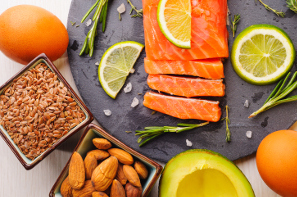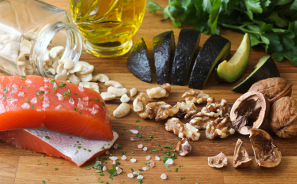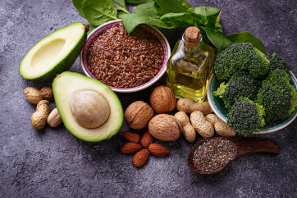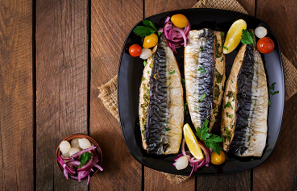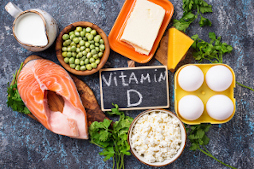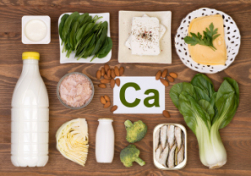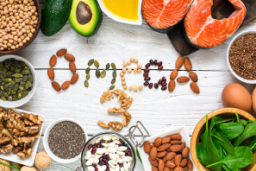Why are Omega 3s so important for your pregnancy?
Essential fatty acids for the pregnant mother and baby
Omega-3 fatty acids have vital functions in pregnancy and the brain development of the baby. They are part of all our cells and neurons. We tell you what they are and how much you should take so that neither you nor your child are lacking these nutrients, which are crucial for the optimal development of the foetus.
Omega 3, fish in particular
Omega-3 fatty acids are essential for our health and even more so for pregnant women and the baby growing inside her uterus. So it's not surprising that we have been hearing about omega-3s for some time now, and in fact, you can find a wide range of supplements of this nutrient or omega-3-fortified foods.
However, they do have one small drawback: "Our bodies are capable of making only a small amount of omega-3, but not enough to meet our needs. The only way to obtain the necessary levels is through our diet, by eating foods that are rich in omega-3s. Omega 3 is found mainly in fish and some seafood," says Ángel Gil, president of the Ibero-American Foundation for Nutrition (FINUT) and professor of the Department of Biochemistry and Molecular Biology II at the University of Granada.
Fatty acids for pregnancy and for the baby
Of the fatty acids that make up omega-3s, the most important and the ones that we are most interested in with regard to pregnancy and the good development of the baby are:
- DHA or docosahexaenoic acid is part of the membranes of each and every human cell, including neurons. "Up to 60% of the membranes of the retina, which is a specialised neural structure, are DHA," stresses Professor Gil. And, of course, it is also present in the brain and retina of the baby now growing inside you.
- EPA or eicosapentaenoic acid reduces the synthesis of triglycerides in your liver and is related to the coagulation function and the proper functioning of the immune system and the cardiovascular system.
Other benefits of Omega 3
The importance of the omega 3 goes even further, as Ángel Gil insists:
- "They contribute to the fluidity of cell membranes and enable the transport of our cell materials, both nutrients and waste products".
- Thanks to omega-3 fatty acids, we manufacture other compounds, including prostaglandins, which induce labour.
- Omega-3s help prevent inflammation. In fact, "if we do not take the necessary amount, our bodies are more prone to developing inflammatory phenomena," says the professor of the University of Granada.
- It limits the synthesis of triglycerides in the liver and has a cardiovascular risk reduction effect.
How does Omega 3 help your baby?
During pregnancy omega 3 is even more important because the foetus needs omega 3 DHA for the formation of the foetal nervous system, and this is achieved through the mother’s ingestion of Omega 3. "The foetus is protected by the mother, who sends these fatty acids to the foetus through specific transporters in the placenta," explains Ángel Gil. But be careful: the baby will receive a sufficient amount of omega 3 only as long as the mother's levels are adequate.
- “If the mother has low levels of omega-3, the child will have low levels as well. In this sense, Ángel Gil explains that several studies "have shown that an adequate intake of fatty acids by the mother is associated with a normal foetal weight, while mothers with fatty acid deficiencies have smaller children". It has been found that consumption of EPA and DHA during pregnancy lengthens the duration of the pregnancy by an average of 6 days and helps increase the weight of the new-born by more than 100 grams.
Moreover, the importance of omega-3 fatty acids extends beyond pregnancy, into breastfeeding. Breast milk contains these fatty acids and infants who take sufficient amounts of omega-3s when breastfeeding, have greater visual acuity than those who do not take adequate amounts. "If the mother does not take them, it will affect the visual acuity of her child," says Ángel Gil. Some studies also show that children of mothers who take sufficient amounts of omega-3s have better verbal skills as they grow up.
How much Omega 3 do you need to take during your pregnancy?
The FAO and the WHO established the recommendations for omega-3 fatty acids some time ago:
- A healthy adult should take at least around 250 mg of omega-3s a day, although the ideal amount is 1 g a day.
- For pregnant women "as they are supporting a new life and all the cells have DHA, the minimum amount is 0.5 g a day", according to Professor Ángel Gil.
These amounts are generally not currently being reached, two recent studies on consumption by the Spanish population (Anibes and Enalia) have shown. "An important part of the population does not comply with the minimum required intake of omega-3. People who eat three or four servings of fish comply with the recommendations, but those who eat less than two portions do not," explains Ángel Gil.
Omega-3-rich foods
- The main dietary source of omega-3s is oily fish – the fattiest fish such as tuna, mackerel, sardines, salmon, anchovies, etc.
- White fish, as they have less fat, provide a lower amount of omega-3 per serving. Shellfish, for example clams, mussels and octopus, also contain omega-3 but the amount provided per serving is lower than that of oily fish.
- Omega-3 is also present in eggs, although in much smaller quantities, and in the viscera of animals.
- Among the foods of vegetable origin, nuts and pumpkin seeds, linseed and seaweed stand out, as well as flax, rapeseed, canola and soya oils, but in much higher quantities.
- It is also found in green leafy vegetables, although its availability to the body is very low.
What if I am a vegetarian and do not eat fish?
If you are a vegetarian or don't eat fish for whatever reason, there are other options for taking omega-3s:
- Supplements: "From a public health point of view, a varied diet including fish is recommended. But if for whatever reason fish is not consumed, supplements are an option, but always under the supervision of a physician," warns Ángel Gil. "Self- medicating does not work, because an excess of omega-3s can have adverse consequences. For example, taking more than three grams a day has effects on blood coagulation."
- Seaweed: Women who follow a vegetarian diet can also opt for seaweed. "Fish do not make omega-3s. They have them because they eat seaweed and benefit from the phytoplankton, and that’s where omega-3 is found," says Professor Gil. You can need to take omega-3 supplements, because vegetables alone are not enough.
- Omega-3 fortified foods.






